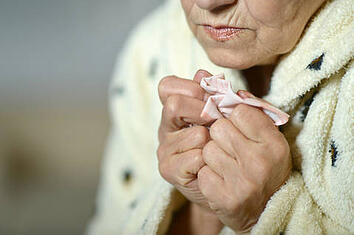 Seniors are particularly vulnerable to complications from pneumonia. In fact, according to the CDC, pneumonia -- along with influenza -- is one of the leading causes of death for people aged 65 and older. Don’t miss these four pneumonia prevention tips designed to help keep seniors safe from this life-threatening illness.
Seniors are particularly vulnerable to complications from pneumonia. In fact, according to the CDC, pneumonia -- along with influenza -- is one of the leading causes of death for people aged 65 and older. Don’t miss these four pneumonia prevention tips designed to help keep seniors safe from this life-threatening illness.
1. Awareness
While pneumonia typically comes with warning signs including fever, chill and cough, symptoms can be missing in seniors. In other cases, pre-existing health conditions may mask pneumonia symptoms. Seniors with dementia or Alzheimer’s, meanwhile, may be unable to report their symptoms.
Be on the lookout for non-respiratory symptoms, including dizziness, weakness, delirium, or vague “unwell” feelings. If any changes or symptoms do occur, check in with your loved one’s health care practitioner.
2. Immunizations
Did you know you can reduce your aging loved one’s chances of developing pneumonia with a simple one-time action? While the effectiveness of flu shots is widely known, many people are unaware of the importance of the pneumococcal vaccine. Recommended by leading healthcare authorities, the vaccine is one of the single most effective defenses against pneumonia. It’s also important to be vaccinated for influenza, since it can lead to pneumonia. Caregivers should also be vaccinated to lessen the risk of exposing seniors to the disease.
3. Hygiene
Germs related to a variety of illnesses, including common colds, flu, and other basic respiratory infections, can lead to pneumonia. Frequent hand washing can help stop the spread of these conditions; hand sanitizers are also an effective preventative measure. Even dental infections can eventually result in pneumonia, so good oral health care is also necessary.
Unfortunately, you can’t control the hygiene of others. Avoid exposing your elderly loved one to people who are sick, as many illnesses which circulate throughout the population can lead to pneumonia.
4. Boost Your Immune System
There are a number of ways for seniors to achieve stronger bodies which are better prepared to fend off pneumonia. Exercise is essential, as are healthy food choices, adequate water intake and plenty of sleep.
Because it interferes with the lungs’ ability to ward off infection, smoking is a major risk factor for pneumonia. If your aging loved one hasn’t already kicked the habit, here’s one more reason to add to the list.
While talk of “flu season” may take center stage during this time of year, pneumonia remains a significant danger to older adults. These four pneumonia prevention tips can help you minimize the threat and safeguard your aging loved one’s health this winter.
Key Takeaways
- Pneumonia joins influenza as one of the biggest threats to the health and wellness of older adults.
- The more you know about the symptoms of pneumonia, the more you can identify warning signs and seek proper medical care.
- The one-time pneumonia shot is a valuable first line of defense against the disease.
- Healthy lifestyle behaviors -- from hygiene to hydration -- are an essential part of preventing illness.

